Winners of 2012 National Outdoor Book Awards Announced
OutdoorHub Contributors 11.20.12
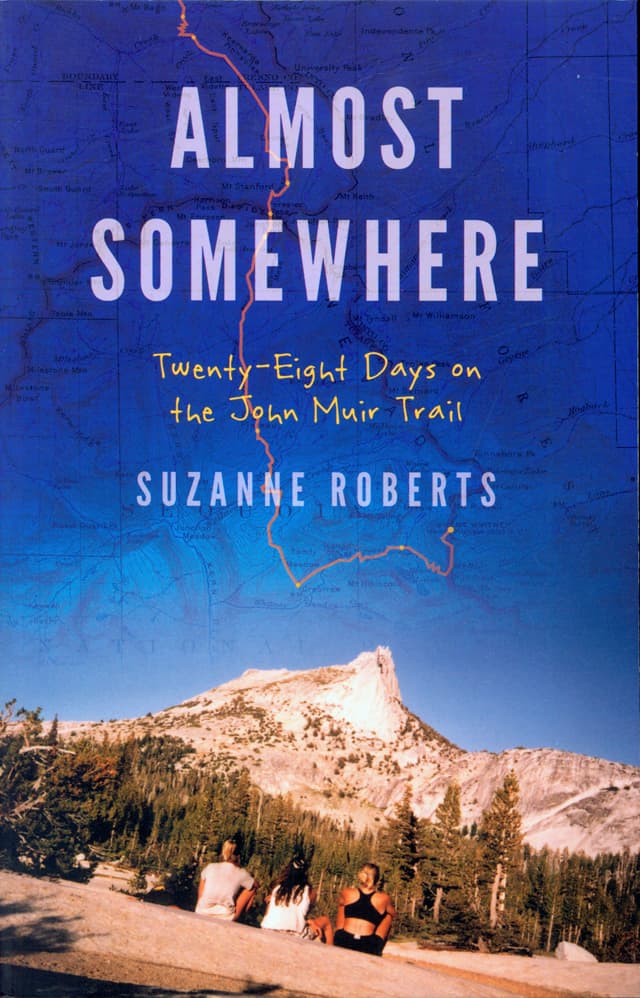
Stunning underwater photography. A coming-of-age story of three women. Wonder and magic in a small patch of forest. Nail biting adventure.
These are some of the themes found among the winners of the 2012 National Outdoor Book Awards (NOBA). The annual awards program recognizes the best in outdoor writing and publishing.
“The judges were unanimous in their assessment of photographer David Hall’s work,” said Ron Watters, Chairman of the Awards Program, “He is a gifted artist and has created a masterpiece.”
Hall’s large format book Beneath the Cold Seas is a collection of photographs taken in the underwater world of the Pacific Northwest.
“To get his photographs, Hall works under exceptionally difficult conditions,” Watters. said. “He dives in bitter cold waters and works without a tripod. Due to the turbidity of the water, he can’t use telephoto lenses and has to get close to his subjects. Despite these obstacles, he does exquisite work.”
In addition to Beneath the Cold Seas, fourteen other books were honored in this year’s National Outdoor Book Awards. The awards program is sponsored by the National Outdoor Book Awards Foundation, Idaho State University and the Association of Outdoor Recreation and Education.
Among the winners is Almost Somewhere: Twenty-Eight Days on the John Muir Trail by Suzanne Roberts. It is one of two winners in the Outdoor Literature category.
Almost Somewhere is about a backpacking trip that Roberts takes with two other women. It’s outdoor adventure from a feminine perspective. Roberts obsesses with her weight and grapples with conflicted views of sex and relationships. One of the other women on the trip struggles with bulimia.
“It’s an introspective and honest narrative of their journey,” said Watters. “What emerges from the book is a revealing and insightful coming-of-age portrait of women of the post baby boom generation.”
The other winner of the Outdoor Literature Category is The Ledge by Jim Davidson and Kevin Vaughan. It is the true story of Davidson’s desperate attempt to escape from a crevasse on Mount Rainier. After he falls, he finds himself caught with his pack wedged between two walls of ice. Below him is an abyss.
“I promise,” said Watters. “‘This is a book that will keep you turning the pages. Davidson must dig deep into his inner physical reserves, all the while, struggling internally with a range of emotions that alternate between hope, despair, and terror. It’s a spellbinding account.”
The Forest Unseen byDavid George Haskell is the winner of the Natural History category. Haskell describes the natural processes occurring on one square meter of an old growth forest.
“It’s quite a unique and fascinating perspective. Haskell works wonders, using only a tiny patch of forest, and creates for the reader a mesmerizing account of the natural world.”
Two winners were also awarded in the history/biography category. The first of the two is Buried in the Sky: The Extraordinary Story of the Sherpa Climbers on K2’s Deadliest Day by Peter Zuckerman and Amanda Padoan.
Buried in the Sky chronicles the 2008 climbing season on K2, the second highest mountain in the world. During a turn in the weather, eleven climbers died and three others were seriously injured. The authors tell the story of what happened from the Sherpas’ point of view.
“This is a book that really needed to be written,” said Watters. “It finally humanizes the unsung heroes of the mountaineering world and their hopes and dreams for a better life.”
The other winner in the history/biography category is Anything Worth Doing by Jo Deurbrouck. This book is about two men who launch a small wooden dory on Idaho’s Salmon River during flood stage. Their plan is to float all night and all the next day in an attempt to set a 24-hour speed record.
“This is a highly creative and exceptionally well written book. It will keep you glued to the pages,” Watters said.
Complete reviews of these and the other 2012 winners may be found at the National Outdoor Book Awards website at: www.noba-web.org and below:
Outdoor Literature
Winner. Almost Somewhere: Twenty-Eight Days on the John Muir Trail. By Suzanne Roberts. University of Nebraska Press, Lincoln. ISBN 9780803240124.
In the summer of 1993, author Suzanne Roberts and two other women set out on a month-long backpack trip in California’s Sierra Mountains. Almost Somewhere is Robert’s introspective and no-holds-barred account of that journey and the interactions between the three women. What emerges is a revealing and insightful coming-of-age portrait of women of the post baby boom generation. Roberts obsesses with her weight, competes openly with other women for men, and grapples with conflicted views of sex and relationships. One of the other women struggles with bulimia. This is life in an outdoor setting from a feminine perspective: anxiety over strange men met along the way and the challenges of long days on the trail—can Robert’s weakening knees and the health of her bulimic friend hold up to the end? The dialog, the imagery, and the story are so well done and so absorbing that men and women of all generations will find it a satisfying and fulfilling literary treat.
Outdoor Literature
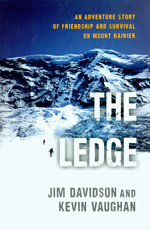 Winner. The Ledge: An Adventure Story of Friendship and Survival on Mount Rainier. By Jim Davidson and Kevin Vaughan. Ballantine Books, New York. ISBN 9780345523198.
Winner. The Ledge: An Adventure Story of Friendship and Survival on Mount Rainier. By Jim Davidson and Kevin Vaughan. Ballantine Books, New York. ISBN 9780345523198.
The Ledge is story telling at its finest. Jim Davidson is descending from a climb of Mount Rainier when he plunges into a crevasse, pulling his partner in with him. Davidson survives the fall, but unknown to him at the time, his pack has stopped him, wedging between two walls of ice. Below him is an abyss. Shortly after he stops, a small avalanche of snow covers him completely. Then his partner hurtles down and lands on top. Somehow Davidson must dig himself out of the snow, provide aid to his critically injured partner, and plan a way to climb out—all the while, delicately balanced on his pack. His is a struggle that involves all of his faculties and which alternates between hope, despair, and terror. From start to finish, this is a story that will hold you spellbound.
Outdoor Literature
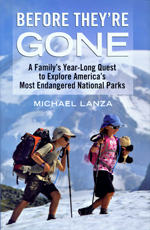 Honorable Mention. Before They’re Gone: A Family’s Year-Long Quest to Explore America’s Most Endangered National Parks. By Michael Lanza. Beacon Press, Boston. ISBN 9780807001196.
Honorable Mention. Before They’re Gone: A Family’s Year-Long Quest to Explore America’s Most Endangered National Parks. By Michael Lanza. Beacon Press, Boston. ISBN 9780807001196.
Michael Lanza is a skilled wordsmith and his finely fashioned handiwork is on full display in Before They’re Gone. Lanza takes his wife and two young children to some of the country’s most famous National Parks. They hike, sea kayak, climb, canoe and cross-country ski. It’s a heartwarming narrative of a family and their explorations of wild places. It’s also a cautionary story of what might happen, and is happening, to those spectacular places that they visit as the earth continues to warm.
Natural History Literature
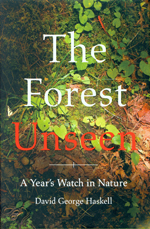 Winner. The Forest Unseen: A Year’s Watch in Nature. By David George Haskell. Viking, New York. ISBN 9780670023370.
Winner. The Forest Unseen: A Year’s Watch in Nature. By David George Haskell. Viking, New York. ISBN 9780670023370.
One square meter. That’s what The Forest Unseen is about: one square meter of a Tennessee forest. But in George Haskell’s able hands, that’s all that is needed to reveal a world of wonder and magic. An engaging and poetic writer, Haskell takes us on a journey through the seasons, documenting the changes in an old growth forest and describing the many ecological processes occurring there. Through Haskell’s words, the forest comes alive and seeps gently and unobtrusively into our conscience. Haskell has done it masterfully—writing with a quiet humility and a deceptive simplicity that mirrors the life in his small patch of the natural world.
History/Biography
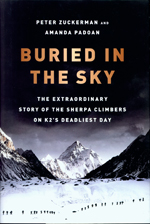 Winner. Buried in the Sky: The Extraordinary Story of the Sherpa Climbers on K2’s Deadliest Day. By Peter Zuckerman and Amanda Padoan. W. W. Norton, New York. ISBN 9780393079883.
Winner. Buried in the Sky: The Extraordinary Story of the Sherpa Climbers on K2’s Deadliest Day. By Peter Zuckerman and Amanda Padoan. W. W. Norton, New York. ISBN 9780393079883.
Buried in the Sky is a significant departure for mountaineer literature. In a reversal of perspective, the book chronicles the story of climbing K2 from the Sherpas’ point of view. What happened on K2 in 2008 shocked the mountaineering world. Eleven climbers died and three others were seriously injured. It’s through the eyes of Sherpas that Peter Zuckerman and Amanda Padoan tell the story of those fateful hours on the mountain. Impeccably researched, the two authors travelled to Nepal and Pakistan where they conducted interviews with Sherpa climbers, their families, relatives and friends. They deal with the worries of Sherpa wives and the yearly tragedies weathered by their close-knit families. It’s a book that finally humanizes the unsung heroes of the mountaineering world and their hopes and dreams for a better life.
History/Biography
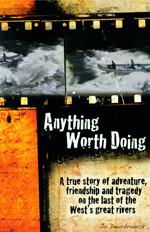 Winner. Anything Worth Doing: A True Story of Adventure, Friendship and Tragedy on the Last of the West’s Great Rivers. By Jo Deurbrouck. Sundog Book Publishing, Idaho Falls, ID. ISBN 9780985257804.
Winner. Anything Worth Doing: A True Story of Adventure, Friendship and Tragedy on the Last of the West’s Great Rivers. By Jo Deurbrouck. Sundog Book Publishing, Idaho Falls, ID. ISBN 9780985257804.
Jo Deurbrouck brings to life the story of two men who launch a small wooden dory in the roiling waters of Idaho’s Salmon River. Their plan was to float all night and all the next day in an attempt to set a 24-hour speed record. In this highly creative and exceptionally well written account, Deurbrouck traces the lives of these two men: one an aging, bear of a man, a Vietnam era veteran and sometimes recluse river guide whose past includes boxing and ballet dancing; and the other a fit, young man, a rising star among river runners, full of ideas and ambitions. They put on the river in peak flood and are flung downstream, maneuvering their small boat through churning rapids, dodging boiling holes, and fending off massive logs caught in the current with them. You’ll find yourself glued to the pages as Deurbrouck deftly steers the narrative to a building climax. This is an impressive piece of work and a welcomed addition to river literature and lore.
Design and Artistic Merit
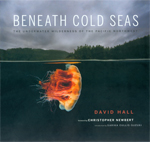 Winner. Beneath Cold Seas: The Underwater Wilderness of the Pacific Northwest. By David Hall. University of Washington Press, Seattle and Greystone Books, Vancouver. ISBN 978022295991160.
Winner. Beneath Cold Seas: The Underwater Wilderness of the Pacific Northwest. By David Hall. University of Washington Press, Seattle and Greystone Books, Vancouver. ISBN 978022295991160.
This book is a work of art from every possible angle—from the exquisite photographs, to the book’s design, to its flawless printing and production process. There’s no other way to describe it: David Hall has created a masterpiece. It’s not something that came easy. His underwater photographic technique had been painstakingly developed and refined over years of work. And what a difficult environment in which to work: diving in bitter cold waters, working in a neutrally buoyant state without a tripod, not having the ability to use telephoto lenses (because of the turbidity of the water), and dealing with a limited amount of time (due to air and nitrogen concerns). Hall has everything right in this book. There is nothing extraneous, and nothing missing. This is a complete and moving immersion in the breathtaking underwater world of the Pacific Northwest.
Children’s Category
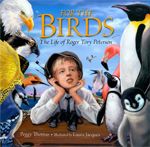 Winner. For the Birds: The Life of Roger Tory Peterson. By Peggy Thomas. Illustrated by Laura Jacques. Calkins Creek, Honesdale, PA. ISBN 9781590787649.
Winner. For the Birds: The Life of Roger Tory Peterson. By Peggy Thomas. Illustrated by Laura Jacques. Calkins Creek, Honesdale, PA. ISBN 9781590787649.
For the Birds is a delightful biography for children from 7 to 11 years of age. Who is it about? Why . . . none other than “Professor Nuts Peterson.” Professor Nuts, who might carry a snake in his pocket or a bird’s egg in his hat, is the American artist and passionate bird lover who created the Peterson Field Guides. His guides weren’t designed for scientists and specialists. Rather, they were for everyone, making it easier for adults—and kids of all stripes and ages—to identifying birds, animals and plants. Author Peggy Thomas quite handedly describes Peterson’s life from his childhood, to his success as an illustrator, and to his work as a conservationist. Fitting winningly with the text are bright and cheery illustrations by Laura Jacques.
Nature and the Environment
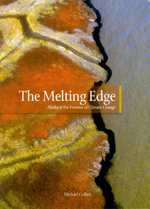 Winner. The Melting Edge: Alaska at the Frontier of Climate Change. By Michael Collier. Alaska Geographic Association, Anchorage. ISBN 9780982576519.
Winner. The Melting Edge: Alaska at the Frontier of Climate Change. By Michael Collier. Alaska Geographic Association, Anchorage. ISBN 9780982576519.
There is no better place in the United States to observe the effects of climate change than Alaska: Glaciers are retreating, permafrost is thawing, and coastal areas are eroding. While much has been written about the subject, author Michael Collier takes things a step further and shows us the consequences of global warming by the use of colorful and instructive photographs. It’s a complex subject, but Collier provides concrete examples and boils it down to the essentials. In the process, he takes us to the far corners of Alaska to learn from the scientists studying the effects of a changing climate and from the people living it day to day.
Nature and the Environment
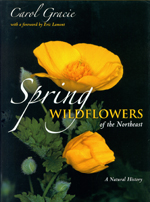 Honorable Mention. Spring Wildflowers of the Northeast: A Natural History. By Carol Gracie. Princeton University Press. Princeton. ISBN 9780691144665.
Honorable Mention. Spring Wildflowers of the Northeast: A Natural History. By Carol Gracie. Princeton University Press. Princeton. ISBN 9780691144665.
Spring Wildflowers is as elegant as the flowers found within its pages. That’s due to the multi-talented Carol Gracie who is a writer, a botanist and a photographer. In the book, she describes a host of Northeastern plants, but she doesn’t stop at the usual botanical boundaries. Unique among plant guides, she goes on to include what species pollinate each plant. She further firmly places each plant into the context of its habitat, what animals consume it, how it has been used as a medicinal plant. Gracie’s book is a noteworthy achievement and quite effectively broadens our thinking about plants to include their many-sided relationship with all aspects of the ecosystem.
Nature and the Environment
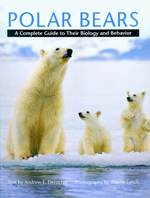 Honorable Mention. Polar Bears: A Complete Guide to Their Biology and Behavior. By Andrew E. Derocher. Photographs by Wayne Lynch. The John Hopkins University Press, Baltimore. ISBN 9781421403052.
Honorable Mention. Polar Bears: A Complete Guide to Their Biology and Behavior. By Andrew E. Derocher. Photographs by Wayne Lynch. The John Hopkins University Press, Baltimore. ISBN 9781421403052.
There’s a certain attraction to polar bears, and Andrew Derocher’s book adds to that attraction by deepening our understanding of these animals and the impact that human activity is having upon them. Derocher lays out for us a comprehensive review of work done on these great mammals including their biology, ecology and behavior. The text is supplemented by stunning photographs by Wayne Lynch who has spent decades following the bears. It all works excellently together—photos and text—and the reader comes away with a renewed appreciation for one of nature’s most charismatic carnivores.
Instructional / How-to
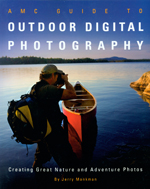 Winner. AMC Guide to Outdoor Digital Photography: Creating Great Nature and Adventure Photos. By Jerry Monkman. Appalachian Mountain Club, Boston. ISBN 9781934028506.
Winner. AMC Guide to Outdoor Digital Photography: Creating Great Nature and Adventure Photos. By Jerry Monkman. Appalachian Mountain Club, Boston. ISBN 9781934028506.
If you’ve been prospecting for just the right book on outdoor digital photography, look no further. You’ll strike pay dirt with this new Appalachian Mountain Club guide. Accomplished photographer Jerry Monkman who has worked for a variety of national outdoor and wildlife magazines, nicely elaborates on the subject in one easily readable and visually instructive book. The book covers equipment, lenses, lighting, composition, exposure, and processing software. The text is supplemented with case studies and expert advice. This is outdoor photography after all, and Monkman doesn’t leave out suggestions on taking photos in adverse weather. You’ll find plenty to be mined from this fine reference, and you won’t even need a pick and shovel.
Instructional / How-to
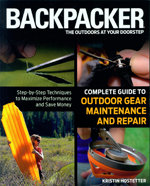 Winner. Backpacker Magazine’s Complete Guide to Outdoor Gear Maintenance and Repair: Step by Step Techniques to Maximize Performance and Save Money. By Kristin Hostetter. Falcon Guides, Guilford, CT. ISBN 9780762778317.
Winner. Backpacker Magazine’s Complete Guide to Outdoor Gear Maintenance and Repair: Step by Step Techniques to Maximize Performance and Save Money. By Kristin Hostetter. Falcon Guides, Guilford, CT. ISBN 9780762778317.
If you were to search the outdoor world for someone to write about repairing gear, you wouldn’t find anyone better suited for the job than Kristin Hostetter. Hostetter has been Backpacker Magazine’s gear editor since 1994, and she knows a thing or two about the subject. In the Complete Guide, Hostetter has consolidated her wide ranging knowledge into one comprehensive volume covering the repair of all sorts of equipment: boots, packs, sleeping bags, clothing, stoves—and oh, how could we forget? —she also includes a special chapter on what can be done with a roll of duct tape. The information from her book is particularly useful when you’re out in the field. Stuff happens out there, and with Hostetter’s clear and helpful instructions you’ll be back on the trail in no time. Add it all up, throw in the book’s classy and intelligent design, and this guide scores right at the top of its class.
Outdoor Adventure Guidebooks
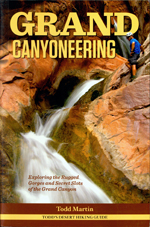 Winner. Grand Canyoneering: Exploring the Rugged Gorges and Secret Slots of the Grand Canyon. By Todd Martin. Todd’s Hiking Guide, LLC., Phoenix. ISBN 9780978961435.
Winner. Grand Canyoneering: Exploring the Rugged Gorges and Secret Slots of the Grand Canyon. By Todd Martin. Todd’s Hiking Guide, LLC., Phoenix. ISBN 9780978961435.
If you’re into canyoneeering, Grand Canyoneering is a must-have. Handsomely illustrated with color photographs throughout, this outstanding guide includes thorough explanations of over 100 different trips into the tributary drainages and ravines of the Grand Canyon. Trip descriptions are supplemented with topographic maps, key GPS coordinates, and information on water sources, specialized equipment and natural history. Todd Martin writes in a comfortable, conversational style which makes the guide a pleasure to read; yet, at the same time, he is exacting when it comes to describing canyon routes. The sheer volume of material alone is impressive, and combined with the photos, maps, and text, it’s decidedly a tour de force of outdoor guidebooks.
Nature Guidebooks
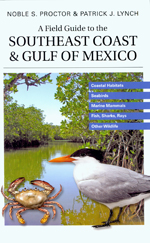 Winner. A Field Guide to the Southeast Coast & Gulf of Mexico. By Noble S. Proctor and Patrick J. Lynch. Yale University Press, New Haven. ISBN 9780300113280.
Winner. A Field Guide to the Southeast Coast & Gulf of Mexico. By Noble S. Proctor and Patrick J. Lynch. Yale University Press, New Haven. ISBN 9780300113280.
Tired of hauling around a library of guidebooks? Here’s the alternative: A Field Guide to the Southeast Coast. It’s not just a guidebook. It is several guidebooks rolled into one. It is a bird guide. It is a plant guide. It is a fish guide. It is a marine mammal guide. This comprehensive work by Noble Proctor and Patrick Lynch includes over 600 species of flora and fauna of the Southeastern coastal regions and Gulf of Mexico. All of this is in one compact and easy-to-navigate guide, perfect for beach goers, hikers, boaters, birders, fishers, snorkelers—and anyone who wants to leave the library at home.

